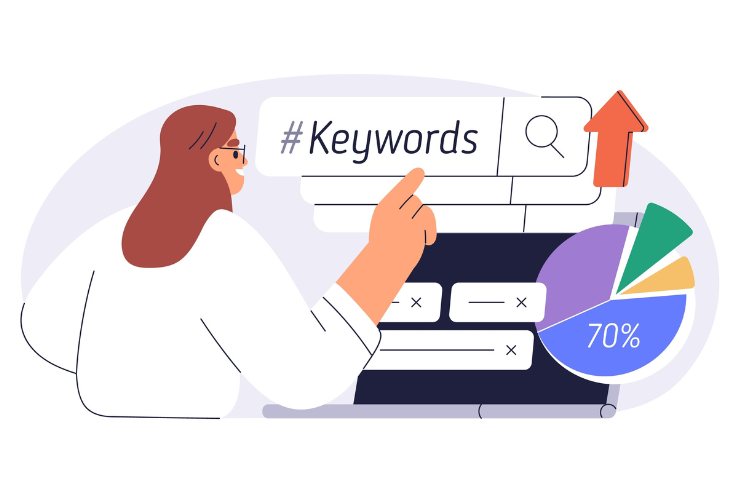Anyone who has dabbled in Search Engine Optimization (SEO) knows it can be complicated. Explaining SEO to clients, especially those with little experience, can be even more daunting. However, as marketing agencies, we are responsible for creating and implementing successful marketing campaigns and informing our clients about best practices and industry changes, including SEO-related ones. If you’re struggling with how to explain SEO to clients, this guide will provide you with the tools and strategies to help bridge the gap in understanding. This can help you understand how to get SEO clients because you build trust and credibility, which helps take the mystery out of the topic for potential clients.
9 Effective Tips on How to Explain SEO to Clients
To bridge the communication gap, we’ve compiled nine simple tips to help you explain SEO to clients in a way that resonates with them. This will make your job easier and empower your SEO clients to understand and appreciate the value of your efforts.
1. Set Clear SEO Expectations Early
Setting realistic expectations is key when explaining SEO to clients. Many clients expect immediate results and believe their website will quickly rank #1 for multiple keywords. It’s crucial to communicate that SEO is a long-term strategy, and results may take several months. Let your clients know that while they may see early improvements in website health and traffic, significant changes require time and consistent effort. Prepare to provide regular updates and monthly reports to keep them informed on progress and any changes in strategy.
2. Communicate SEO Results Regularly
One of the biggest complaints from clients is a lack of communication about SEO results. To avoid this, establish a regular reporting schedule and stick to it. Share concise metrics like search traffic, keyword rankings, and site health. Avoid overwhelming clients with technical jargon or overly detailed reports. Instead, focus on the key points that matter to them and explain SEO outcomes straightforwardly. This will help build trust and show that their investment in SEO is yielding results.
3. Assess Your Client’s SEO Knowledge
Understanding your client’s level of SEO knowledge is essential for effective communication. Some clients may be unfamiliar with SEO basics, while others might have more advanced knowledge. Start by explaining what SEO is and its benefits for their business, and then tailor your communication to their level of understanding. For example, explain that SEO stands for Search Engine Optimization and involves optimizing a website to rank higher in search engine results. This foundational knowledge will help clients feel more comfortable and engaged in SEO.
4. Explain Google’s Role in SEO
When explaining SEO to clients, it’s important to clarify that Google’s algorithms significantly determine website rankings. Let clients know that Google frequently updates its algorithms, which can impact rankings and traffic. Being transparent about these changes helps manage expectations and build trust. Reassure clients that following SEO best practices will help mitigate any negative impacts from these updates.
5. Outline SEO Best Practices
As an SEO professional, part of your job is to educate clients on SEO best practices. Provide a brief overview of the key components of SEO concepts, such as keyword research, on-page optimization, and backlinks. Explain why these elements are important and how they contribute to higher rankings. For example, discuss the importance of having optimized page titles, meta descriptions, and alt text for images. This will help clients understand the work involved in SEO and why specific strategies are necessary.
6. Keep Clients Informed About SEO Changes
SEO is an ever-evolving field, and informing clients about any changes affecting their websites is important. Whether it’s a new Google update or a shift in SEO best practices, ensure your clients know these changes. This proactive approach will help them understand the dynamic nature of SEO and appreciate the ongoing efforts required to maintain and improve their rankings.
7. Use Real-World SEO Examples
One of the best ways to explain SEO to clients is by using real-world examples. Share case studies demonstrating how your SEO strategies have improved website traffic and conversions for other clients’ SEO. Show before-and-after comparisons of a website’s performance to illustrate the impact of SEO. These examples make the concept of SEO more tangible and relatable, helping clients see the value of your work.
8. Walk Clients Through the SEO Process
To demystify SEO, walk your clients through each step of the process. Explain key activities such as keyword research, on-page optimization, and building backlinks. Use simplified flowcharts or infographics to visually represent the SEO journey, making it easier for clients to understand. By breaking down the process into manageable steps, you help clients see how SEO works and why each step is important.
9. Discuss SEO ROI and Key Metrics
Ultimately, clients want to know how SEO will impact their bottom line. Explain the concept of ROI (Return on Investment) and how SEO contributes to it. Highlight key metrics such as increased website traffic, higher search rankings, and improved conversion rates. Use dashboards or spreadsheets to visually present these metrics and demonstrate the value of SEO in terms they understand. This will help clients see the direct benefits of their investment in SEO.
Simplifying SEO Jargon: Speaking Your Client’s Language
When explaining SEO to clients, it’s important to avoid jargon that may confuse them. Here are some common SEO terms and how to explain them in a client-friendly way:
- Backlinks: “Think of backlinks as votes of confidence from other websites. The more you have from reputable sources, the more credible your online reputation is.”
- Meta Description: “It’s like the blurb on the back of a book. It gives people a quick idea of what they’ll find if they click the link.”
- Crawlability: “Imagine your website is a building. Crawlability is like ensuring all the doors and hallways are accessible so Google can easily check every room.”
- Domain Authority: “Think of this as your business’s credit score for the internet. The higher the score, the more trustworthy your site appears to Google.”
- Alt Text: “Alt text is like Braille for search engines. It helps them ‘see’ images by reading your text description.”
How to Explain SEO to Clients: Beginner vs. Intermediate
Effectively explaining SEO to clients requires tailoring your approach based on their familiarity. Here’s how to break down SEO for clients with varying levels of understanding:
Beginner Explanation
When explaining SEO to a beginner, it’s essential to use simple language and relatable analogies to make the concept accessible. Start with the basics and focus on SEO’s core purpose.
Example Explanation
“At Oyova, we think of SEO—short for Search Engine Optimization—as a way to help people find your business online more easily. Imagine your website is like a store in a big city. There are thousands of other stores, and you want yours to be on the main street where everyone can see it. SEO helps your ‘store’ reach that main street by ensuring your website appears at the top of search results when people look for products or services like yours on Google. We do this by improving your site’s content, structure, and popularity so that Google sees it as a valuable and trustworthy source.”
Key Points for Beginners
- Focus on Visibility: Explain that SEO is about making their website visible to potential customers searching for related terms or services.
- Basic Benefits: Highlight that a well-optimized site attracts more visitors, which can lead to increased business.
- Non-technical Language: Avoid using SEO jargon or technical terms that may confuse them.
Intermediate Explanation
You can provide a more detailed explanation that includes some technical aspects and strategic insights for clients who have a basic understanding of SEO or are familiar with digital marketing concepts.
Example Explanation
“SEO, or Search Engine Optimization, is a strategic approach to improve your website’s ranking on search engines like Google. Think of it like a set of guidelines or best practices that help your site become more attractive to search engines. There are two main types of SEO: on-page and off-page.
- On-page SEO focuses on optimizing your pages’ content and HTML source code. This includes using the right keywords, optimizing meta descriptions and headers, and ensuring your website is mobile-friendly and fast-loading.
- Off-page SEO involves activities outside your website that influence rankings, like building high-quality backlinks from other reputable sites.
The goal is to improve both the relevance and authority of your website so that search engines trust it as a reliable source of information. A higher ranking means more visibility, clicks, and, ultimately, more business. SEO is an ongoing process because search engines constantly update their algorithms, so staying on top of best practices and adapting our strategies is essential.”
Key Points for Intermediates
- Introduce Key Concepts: Discuss on-page and off-page SEO to comprehensively overview the strategies.
- Use Relatable Analogies: While introducing more advanced concepts, use analogies that relate to their business or everyday experiences.
- Emphasize Continuous Improvement: Explain that SEO is not a one-time effort but requires continuous optimization and monitoring to maintain and improve rankings.
By tailoring your explanations based on the client’s knowledge level, you can ensure they feel informed and confident in the SEO strategies being implemented for their business.
Still Having Trouble? The Benefits of Partnering with an SEO Agency
For marketing agencies facing challenges with SEO due to limited resources and time, partnering with a reputable SEO agency offers a range of benefits that can streamline your efforts and enhance results. Here’s how collaborating with an expert team can be your answer to the question how can I get SEO clients:
1. Access to Specialized Expertise

When your resources are stretched thin, it’s crucial to leverage the skills of well-versed SEO professionals. A reputable SEO agency brings a team of specialists with extensive experience and up-to-date knowledge. This ensures your SEO strategy is effective and aligned with the latest industry standards.
2. Cost-Effective Solution
Building and maintaining an in-house SEO team can be expensive. Outsourcing SEO provides access to a team of experts without the overhead costs associated with hiring and training. This cost-effective solution allows you to deliver high-quality SEO services while managing your budget efficiently.
3. Focus on Core Services
Outsourcing SEO lets your team concentrate on core business functions and strategic initiatives. SEO is a complex and ongoing process that demands dedicated attention. By partnering with an agency, you can ensure that specialists handle SEO while your team focuses on delivering other critical services.
4. Utilize Advanced Tools and Technologies
SEO agencies can access advanced tools and technologies beyond your budget. These tools facilitate comprehensive keyword research, competitive analysis, and performance tracking. Partnering with an agency ensures you benefit from these resources, making your SEO strategies more effective.
5. Proven Results and Track Record
Reputable SEO agencies come with a proven track record of delivering tangible results. With case studies and testimonials showcasing their ability to improve rankings, increase traffic, and boost conversions, you can trust that your SEO efforts will yield successful outcomes.
6. Continuous Monitoring and Adaptation
SEO requires ongoing monitoring and adjustments to remain effective. A dedicated SEO agency will continuously track performance, analyze data, and make necessary changes to adapt to search engine algorithm updates and industry trends. This proactive approach ensures your SEO strategies stay competitive.
7. Strategic Guidance and Recommendations
An SEO agency provides valuable insights and recommendations based on thorough analysis. Their guidance on optimizing content, improving technical SEO, and enhancing online presence helps align SEO efforts with your client’s business goals.
Partner with Oyova for Your SEO Needs
Partnering with an experienced SEO agency like Oyova can be a game-changer for your agency, especially when dealing with limited resources and time constraints. Our team of experts is dedicated to providing tailored SEO solutions that drive results and help you meet your client’s needs. We have experience and know the questions to ask SEO clients for higher conversions.
If you’re looking to enhance your SEO efforts and deliver exceptional outcomes for your clients, we’re here to help. Contact us today to learn more about how Oyova can support your SEO strategy and elevate your services. Let’s work together to achieve remarkable SEO results and take your agency to new heights.
Our Awards













